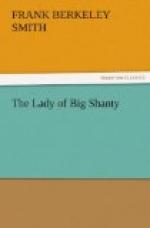With a quick gesture he turned to Holcomb. “Will you keep up the fire, Billy? I want all of you to get some sleep.”
“What does it mean, Sam?” asked Alice nervously.
“News, I hope,” replied Thayor. “Go to sleep, dear; you need it.”
The hide-out stood gazing nervously at the ground. “Do you feel better?” she asked, approaching him. “You are to sleep next to your father, I believe.”
“Yes, marm,” he stammered awkwardly; “I’m warm. Thank ye for the supper—I ain’t hongry no more.”
She nodded good night and went back to her blanket next to Margaret. Bending over the girl she lifted the mass of fair hair and kissed her on the forehead. Then she drew her own blanket about her.
Thayor and the hide-out seated themselves on a log lying on the other side of the fire, out of hearing.
“Mr. Thayor,” began Dinsmore, after a moment’s silence, “they’ve treated ye like a dog.”
Thayor met the owl-like eyes grimly, a bitter smile playing about his unshaven chin, but he did not confirm the statement.
“But there’s one that’ll never trouble ye no more,” exclaimed Dinsmore, looking queerly at the man beside him.
“Who?” asked Thayor.
“Bergstein, damn him!” returned Dinsmore slowly; “I seen him.”
“But he left the camp days ago—the morning I discharged him.”
“He’s started on consid’ble of a trip now,” replied the hide-out. “I see what was left of him.”
“Dead!” exclaimed Thayor.
“Burned blacker ’n a singed hog. They ain’t much left of him, and what they is ain’t pleasant to look at. He ain’t got but one arm left and that’s clutchin’ a holt of a empty ker’sene can.”
Thayor gave a short gasp.
“And it was that cheat, Bergstein!” he cried in amazement.
“More devil than cheat,” replied Dinsmore—“and three-quarters snake. The gang he trained agin ye done what he told ’em to—they burned ye out with him a-leadin’ ’em. I watched him and know—see him with the can ’fore the fire began. It’s as plain as day, Mr. Thayor. Father’s right—yer life ain’t safe till ye git to the cars.”
Thayor’s grizzled, unshaven jaw closed hard. He sat staring into the fire, every muscle in his haggard face tense.
“There’s men me and you know in these woods now,” continued Dinsmore, “who ain’t no more to blame in this ornery business ’n I be.”
Again Thayor looked up in surprise.
“I had hoped as much,” he said slowly, shaking his head. “There was not one of them, however, that came forward to help us—I am excepting, you understand, your father, Freme, and Holcomb. I owe them a debt of gratitude which I can never repay. Why have you come, Dinsmore?” he added, turning abruptly, with something of the briskness of his old business-like manner.
“Because ye’ve been good to me,” replied the hide-out; “that’s why I come; I wanted to do ye a good turn—I ain’t got nothin’ else to give ye.”




